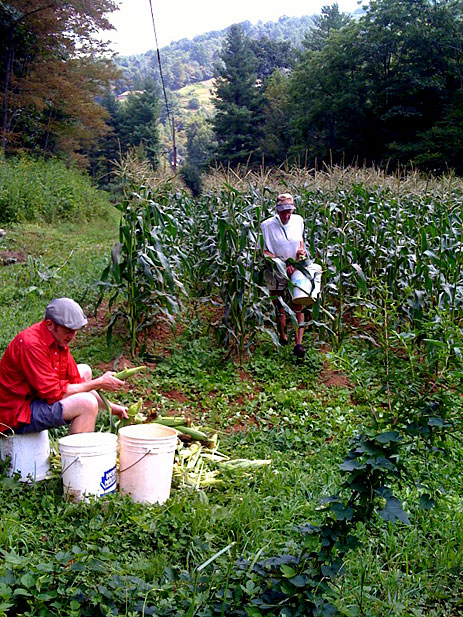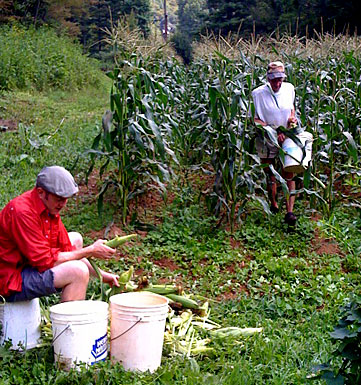Last week, I was We are all children of the corn.(Alice Brook Wilson) denounced as an “anti-corn” “elitist” by a blog funded by the National Corn Growers Association. (Here’s my response on the factual issues raised.)
We are all children of the corn.(Alice Brook Wilson) denounced as an “anti-corn” “elitist” by a blog funded by the National Corn Growers Association. (Here’s my response on the factual issues raised.)
It was a bit surreal, because I’ve been immersed in corn lately at the farm I help run, Maverick Farms in Valle Crucis, N.C. We put in a quarter-acre patch of corn in the spring, and over the past two weeks, it has been ripening. Just about every night, we’ve been eating corn on the cob or slicing corn off the cob to put it in salsas, pastas, etc. On Monday, we had friends over to help us harvest the corn and put it up in the freezer to eat over the winter.
What gives? How can I be immersed in corn, and be anti-corn at the same time? In fact, I often get variations on this question. People will email me and say things like: “After reading your recent attack on the corn industry, I got confused when I saw corn at the farmers market it. Should I avoid it?”
Actually, I’m not anti-corn at all. (I am, after all, someone who once declared traditional Mexican tortillas “one of the treasures of world culinary culture.”) I’m just anti-industrial corn.
To understand my position, let’s consider the tomato. I adore tomatoes, which like corn are just coming into season now. But I loathe the way they’re grown in Florida’s vast industrial tomato fields, where workers are abused and underpaid as a matter of course, where large amounts of agrichemicals are required, and where the tomatoes that emerge are rock-hard, flavorless, and a perfect match for the industrial-meat burgers on which they are so often served.
If you take any fruit, vegetable, or grain, and ramp up its production into vast monocrops, drench it with chemicals, and breed it for yield and portability instead of flavor, you’re going to get something vile. At best, you’ll get an industrial input: a commodity that, if its price is low enough, is useful for large-scale processors and manufacturers — and that ends up being destructive for almost anyone else.
As for ripe sweet corn in August — grown for people to eat, not as cheap fuel for livestock in factory farms or cars — I love it.
Here’s a Tom’s Kitchen column featuring a summer-harvest pasta that leans heavily on corn.



